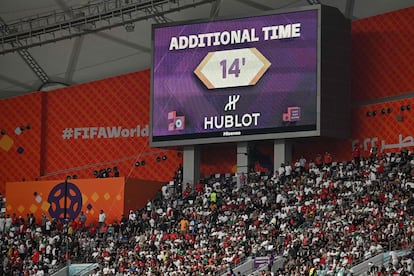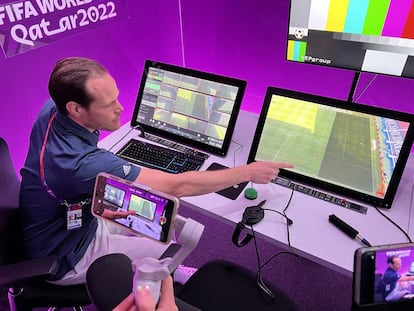Why matches at the 2022 Qatar World Cup are the longest in history
When England played Iran, 24 minutes of stoppage time were added as FIFA issues directive to increase the amount of effective playing time at the tournament

The first half of the Group B game between England and Iran seemed as though it would never end. When the 45th minute arrived, the big screens at the Khalifa International Stadium flashed up 14 minutes of stoppage time. And at that point the stopwatch for the public ceased to tick. Almost a quarter of an hour of additional time with no reference point for fans or players to indicate when the half might end. In the opening game of the 2022 World Cup between host nation Qatar and Ecuador, 10 minutes were added. When the Netherlands and Senegal met, 12 additional minutes were played; 14 were added to the USA-Wales game and the second half of the England-Iran match was extended by a further 10 minutes. In total, 60 minutes were added to the regulation 90 in the first four games of the tournament, an average of a quarter of an hour each. Under normal circumstances, anything over 10 minutes of stoppage time is a rare event. These extensions will continue throughout the Qatar World Cup, and nobody can say they were not warned.
Last Friday, chairman of the FIFA Referees Committee, Pierluigi Collina, held a press conference in Doha to announce his association’s plans for the tournament. Expect games to last 100 minutes, the Italian said. Soccer’s governing bodies have been concerned for years about effective playing time – the amount of time the ball is actually in play. In Spain’s La Liga for example, the average amount of effective playing time average 52 minutes per match. The International Football Association Board has also studied the issue and has introduced modifications to lessen stoppages, such as a substituted player leaving the pitch at the nearest available point instead of heading straight to the team bench.
In Qatar, though, Collina has encouraged referees to squeeze as much out of this meticulousness as possible. On Friday, the FIFA refereeing chief explained that he had instructed match officials at the World Cup to make stoppage time at the end of each half as long as they deem necessary. Even celebrations following a goal are being taken into account. “Think of a match with three goals scored. A celebration normally takes one, one and a half minutes, so with three goals scored, you lose five or six minutes,” Collina said.
During the game between England and Iran, eight goals were scored as England ran out 6-2 winners. Furthermore, in the opening half, Iran goalkeeper Alireza Beiranvand collided with his teammate Majid Hosseini when he was attempting to clear a cross and received treatment on the pitch lasting several minutes to stem bleeding from his nose. After appearing to recover and having returned to his area, Beiranvand sat on the turf again, unable to continue, and had to be substituted.

VAR to feature more prominently in Qatar
The England-Iran game is an extreme example due to the number of goals scored and the injury to Beiranvand but in line with the directive handed to match officials by Collina, games of 100 minutes can be regularly expected at the World Cup, largely because the visits of the referee to the pitch-side VAR (video assistant referee) monitor will be more frequent. Collina’s committee has told all tournament referees that FIFA is determined that not one questionable incident goes unchecked.
As such, FIFA will comply with its objective of offering fans more effective playing time, but the initiative has led to a disorienting experience for supporters in the stadiums: the official stopwatch runs until the 90th minute of a game. From that point on, it will be impossible for spectators and players to know when the end of the game will come, or how much time is remaining to launch one final attack, for example.
Sign up for our weekly newsletter to get more English-language news coverage from EL PAÍS USA Edition
Tu suscripción se está usando en otro dispositivo
¿Quieres añadir otro usuario a tu suscripción?
Si continúas leyendo en este dispositivo, no se podrá leer en el otro.
FlechaTu suscripción se está usando en otro dispositivo y solo puedes acceder a EL PAÍS desde un dispositivo a la vez.
Si quieres compartir tu cuenta, cambia tu suscripción a la modalidad Premium, así podrás añadir otro usuario. Cada uno accederá con su propia cuenta de email, lo que os permitirá personalizar vuestra experiencia en EL PAÍS.
¿Tienes una suscripción de empresa? Accede aquí para contratar más cuentas.
En el caso de no saber quién está usando tu cuenta, te recomendamos cambiar tu contraseña aquí.
Si decides continuar compartiendo tu cuenta, este mensaje se mostrará en tu dispositivo y en el de la otra persona que está usando tu cuenta de forma indefinida, afectando a tu experiencia de lectura. Puedes consultar aquí los términos y condiciones de la suscripción digital.









































